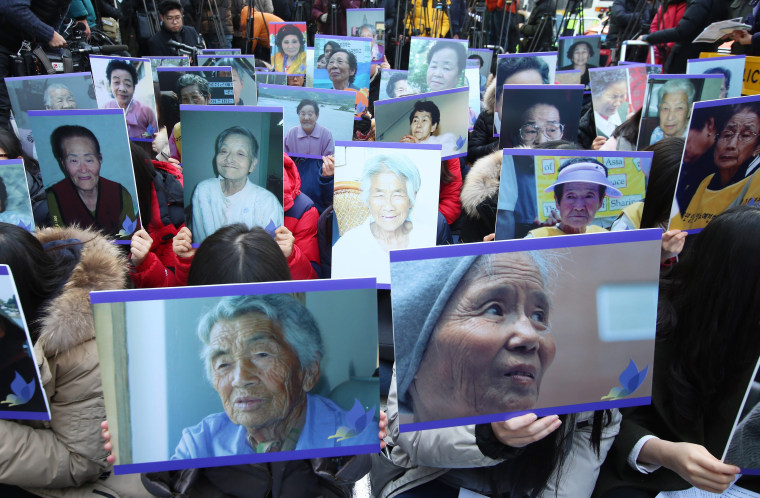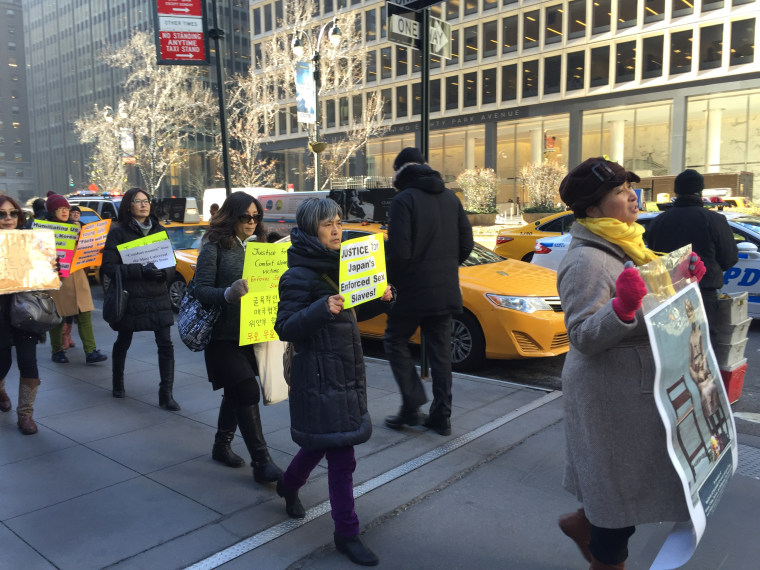A dozen Korean Americans protested Wednesday afternoon outside of the Consulate General of Japan in New York to denounce the agreement reached by the Korean and Japanese governments in December regarding World War II-era "comfort women."
The term is used to describe the women and girls, mostly from Korea, who were forced into Japanese military-run brothels during the war.
The agreement, reached by the two foreign ministers, included an apology from Japanese Prime Minister Shinzo Abe and the promise of financial compensation of $8.3 million for remaining survivors, which was announced as a “final and irreversible resolution” of the matter.
As part of the deal, Seoul will refrain from criticizing Japan over the "comfort women" issue.
Japan also insisted on the removal of a bronze statue in front of the Japanese embassy in Seoul of a barefoot teenage girl, also known as Peace Monument, that symbolizes the trafficked victims that were aged as young as 13.
But survivors of the sexual slavery have openly stated their disapproval of the deal, saying the agreement does not reflect the views of former "comfort women."
RELATED: Asian-American Leaders Respond to Japan-South Korea Agreement Regarding 'Comfort Women'
On Wednesday, the group of Korean Americans marched down Park Avenue from the Japanese consulate to the Korean consulate holding signs that read, “Japanese imperial army raped young girls, shame on you!”
The rally in Manhattan is one of many demonstrations held by Koreans across the world to denounce the controversial deal that many consider unfair towards the "comfort women." Since January 8, 1992, demonstrations have been held every Wednesday in front of the Japanese embassy in Seoul after former "comfort woman" Kim Hak-sun testified in 1991 in public for the first time.

“We’re criticizing the Korean government that agreed to never discuss the ‘comfort women’ issue again,” Eunjoo Kim, an elementary and middle school teacher, told NBC News. “We can’t stand to just watch Korea, Japan, and America accept the Japanese Imperial Army’s wrongdoings to be swept under the rug and erased completely from history.”
RELATED: Japanese PM Slammed During US Visit on Comfort Women Issue
Kim, who began participating in protests two years ago, led Wednesday's protest in New York City.
"In every angle that you look at it, this is totally unfair and unjustifiable."
“Koreans in New York come more on a personal account, because they’re so angry with what had happened. It’s not a Korea issue, it’s not a women’s issue — it’s a crime against humanity, so everyone should care,” she said.
Kim added, "I am a mother of two daughters. If we simply let the atrocities that happened to the Korean girls during Japanese colonialism [where they were] forced into brothels as sex slaves, it could happen again. This isn’t just about politics. I don’t want the same mistakes happening again."
Kim said that whenever something major strikes Korea, the world is quicker to react than the people living in Korea, criticizing a lack of interest in the issue regarding the controversy over the recent deal signed between the two foreign ministries.
Passers-by of the Wednesday rally in New York City showed a wide range of response to the protest.
“I honestly haven’t heard much about it, but it's despicable for not taking responsibility for the crimes that they’ve committed," Joe Stebley, 33, told NBC News.
Deborah Alvo, 51, told NBC News, “Petitions are great, but it’s only a start. Something strong has to be done to stop atrocities happening again.”
But not all Koreans are on the same page regarding the recent government deal. In a statement last week from the Korean American Parents Association of Greater New York, the organization said the apology from the Japanese government was more than expected.
“This is a surprising development coming from Prime Minister Shinzo Abe, an acknowledgement of the Kono Statement that the government has been denying all these years,” Yoonhee Choi, president of the Korean Parents Association of Greater New York, said in a statement in Korean.
The Kono Statement, released in 1993 by then-Japanese Chief Cabinet Secretary Yohei Kono, acknowledged that the Japanese military back then had been "directly or indirectly, involved in the establishment and management of the comfort stations" and that the "recruitment of the comfort women was conducted mainly by private recruiters who acted in response to the request of the military."

Outside of the Japanese consulate on Wednesday, protester Alex Choi, 59, told NBC News he wanted to see Japan take responsibility — and he wants the Korean government to stand up for its people.
"The demands that were asked by the 'comfort women' victims were not met, and their voices was totally excluded from the deal. It also did not include any legal proceedings within the Korean parliament to make it legitimate, so in every angle that you look at it, this is totally unfair and unjustifiable,” he said. “My blood comes from this country, and I want our current government to be responsible about my people.”